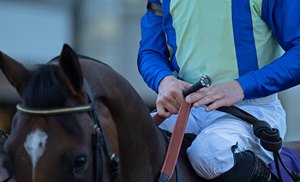CHRB Tables Earnings Fine for Riding Crop Violations


During its monthly meeting March 23, the California Horse Racing Board tabled proposed amendments to its strict riding-crop rule, a portion of which would have authorized a fine of 50% of a jockey's earnings in a graded stakes race for certain violations.
That proposal, which was meant to disincentivize violations in rich races, such as during the Breeders' Cup World Championships this fall at Del Mar in California, generated disagreement between some during the teleconferenced meeting. Four of the seven commissioners voted in support of tabling the riding crop revisions, while the remaining three voted in opposition, desirous of its passing. The amendments could be revisited at a future meeting, perhaps in an amended form.
Beyond the potential for 50% fines in graded stakes races, the amendments would have created a minimum fine of $500 with the potential for a greater penalty or minimum of three suspension days if a violation is egregious or intentional in the stewards' opinion. Also, in trial races—far more common in Quarter Horse racing than in Thoroughbred racing—any crop-related suspension to a jockey would include the subsequent related stakes race regardless if that race is a "designated race," an exempted type of stakes race in which suspended jockeys can typically participate.
Commissioner Alex Solis, a retired Hall of Fame jockey, was the most vocal in his opposition to the proposed rules, which are similarly opposed by the Jockeys Guild, a trade association that represents Thoroughbred and Quarter Horse jockeys.
Another retired Hall of Fame jockey, Darrel McHargue, chief steward for the California Horse Racing Board, favored passing the amended rules, mentioning wide stewards' approval following a meeting.
Since last fall, jockeys in the state have been prohibited from striking a horse more than six times, twice in a row without giving it a chance to respond, or simply in an overhand manner.
Infractions of current rules have led up to $1,000 fines and three-day suspensions for riders, including some out-of-state jockeys that came to ride in stakes races.
Vice-chairman Oscar Gonzales—who along with commissioners Wendy Mitchell and Brenda Davis, voted against tabling the proposed action—said he had concerns with so much money at stake at the Breeders' Cup and with riders converging upon California from elsewhere. He speculated that it could "create a really wild west kind of a situation."
Gonzales believes current penalties might not steep enough for lucrative Breeders' Cup races. Breeders' Cup races are worth a minimum of $1 million, a starting level at which the winning horses in the 2020 event at Keeneland made a minimum of $520,000 and the jockey $52,000 based on a standard 10% commission. This amount is before the rider pays fees to his agent and valet.
Increased penalties were encouraged by anti-racing individuals that telephoned into the meeting, while trainer Doug O'Neill, former trainer and current president of the Edwin J. Gregson Foundation Jenine Sahadi, and Thoroughbred Owners of California president and CEO Greg Avioli were among those disapproving of increased regulation.

Avioli mentioned unintended impacts and placing California at a competitive disadvantage.
"We believe we share the position with the CHRB that the ideal solution to this issue is a national rule," Avioli said.
In announcing a motion to table amendments, chairman Dr. Greg Ferraro asked Solis to meet with jockeys and develop ways to ensure the rule is more strictly adhered to and receive riders' input.
"I think the first part of this rule is fine, in terms of trying to make it consistent throughout the state," Ferraro said. "But I am concerned after this discussion that the rule concerning stakes races, graded races, may be a little harsh."
Earlier in the meeting, CHRB executive director Scott Chaney announced a 10% rise in betting in the state last month compared to a year ago, shortly before the onset of the COVID-19 pandemic.
CHRB equine medical director Dr. Rick Arthur reported well-attended continued educational webinars for horsemen. He also announced seven equine fatalities in California last month, six from training, none from racing, and one in a classification that falls outside those two categories.
